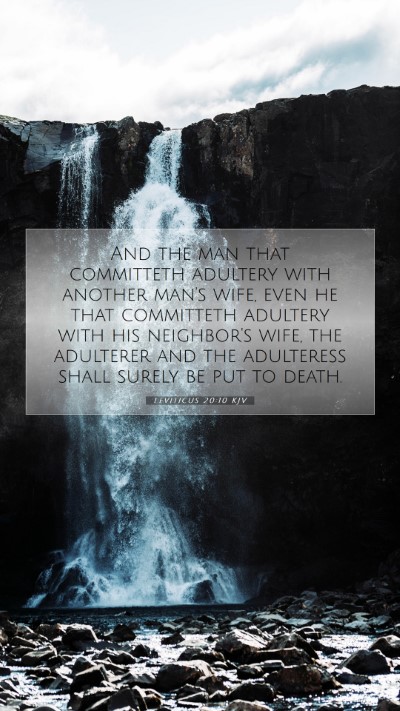Understanding Leviticus 20:10
Leviticus 20:10 states: "And the man that committeth adultery with another man's wife, even he that committeth adultery with his neighbour's wife, the adulterer and the adulteress shall surely be put to death."
Overview of Leviticus 20:10
This verse addresses the grave sin of adultery, highlighting the serious consequences that were prescribed for such an act in the context of ancient Israelite society. Understanding this verse requires a deep dive into its historical context, cultural significance, and theological implications.
Bible Verse Commentary
According to Matthew Henry, this scripture emphasizes the sanctity of marriage and the seriousness with which God views infidelity. It reflects God's desire for faithfulness within marital relationships and compares the act of adultery to treachery against a neighbor.
Albert Barnes adds that this law illustrates the society's commitment to maintaining moral standards. The harsh penalties were meant to deter such behavior and preserve the integrity of family units within the community.
Adam Clarke notes that the severity of the punishment underscores the importance of obedience to God's commandments. He emphasizes that such laws were intended not only for justice but also for the moral edification of the people.
Theological Implications
- Sanctity of Marriage: The verse upholds the view that marriage is a sacred covenant meant to be honored and respected.
- Moral Accountability: It emphasizes that individuals are held accountable for their actions, especially in their relationships with others.
- Community Standards: It suggests that society has a role in establishing and upholding moral standards for the good of all its members.
Historical Context
In ancient Israel, laws surrounding adultery were strict as they were designed to uphold societal order and familial integrity. The death penalty for adultery serves as a historical reflection of the societal values of that time regarding fidelity and family.
Application in Modern Life
While the literal execution of the laws prescribed in this verse is not practiced today, the underlying principles of fidelity and the consequences of betrayal remain relevant. Individuals can reflect on the importance of trust in relationships and the broader implications of their actions on their communities.
Bible Study Insights
This verse serves as an important topic for Bible study groups. Participants can engage in Biblical exegesis to dissect the meaning of the verse and its implications in both historical and contemporary contexts. It can stimulate discussions on the sanctity of marriage, the nature of sin, and community responsibility.
Cross References
- Exodus 20:14 - "Thou shalt not commit adultery."
- Proverbs 6:32 - "But whoso committeth adultery with a woman lacketh understanding: he that doeth it destroyeth his own soul."
- John 8:3-11 - The story of Jesus and the woman caught in adultery, where mercy and judgment meet.
Conclusion
Leviticus 20:10 serves as a dramatic reminder of the significance of marriage and fidelity within the Biblical tradition. Its severe consequences highlight the importance God places on these values and encourages modern believers to reflect on the depths of commitment in relationships.


